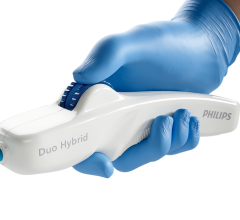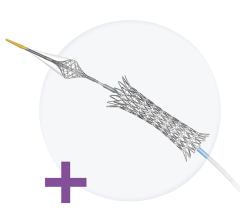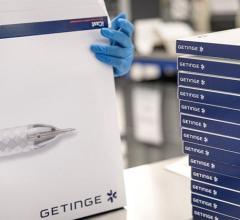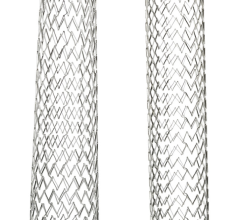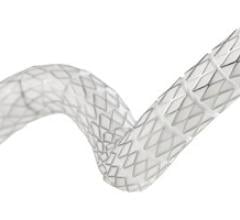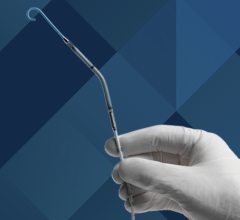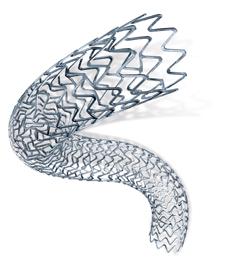
December 12, 2011 - Boston Scientific recently announced U.S. Food and Drug Administration (FDA) approval for the Promus Element Plus everolimus-eluting platinum chromium coronary stent system, the company's next-generation drug-eluting stent (DES) technology. The Promus Element, designed to provide physicians improved DES performance in treating patients with coronary artery disease, is built on a platinum chromium (PtCr) platform with the DES market-leading everolimus drug. The company plans to begin marketing the product in the United States immediately.
The Promus Element uses a proprietary PtCr alloy designed specifically for coronary stenting, which enables thinner struts and enhanced visibility. The innovative design offers a more conformable stent with less recoil and higher radial strength. It employs an advanced, low-profile delivery system featuring a dual-layer balloon and Bi-Segment inner lumen catheter designed to facilitate precise stent delivery across challenging lesions. The everolimus drug and fluorinated copolymer stent coating have been studied in multiple randomized clinical trials and 'real-world' registries, demonstrating excellent long-term safety and efficacy.
"This approval marks an important milestone for Boston Scientific - the beginning of a transition to higher margins on our everolimus stent offering in the U.S. as we shift from the Promus stent to the internally manufactured Promus Element Plus stent system," said Hank Kucheman, CEO of Boston Scientific. "In these challenging markets, this opportunity should represent $200M in additional annualized gross margin contribution for the U.S. and Japan exiting 2012, which is part of the $650 to $750 million opportunity for improvements in operating profit expected over the next several years. The Promus Element Plus stent system is also the latest example of our unparalleled pipeline of drug-eluting stent technologies and reflects our commitment to global DES market leadership. We are proud that our research, clinical, regulatory and manufacturing teams delivered a self-manufactured everolimus stent several months ahead of our goal."
The company expects to record a pre-tax charge of approximately $40 million ($35 million after-tax) during the fourth quarter of 2011 as a result of the early approval and launch timing of the Promus Element Plus Stent System in the U.S. primarily related to inventory reserves which will impact gross margins. This charge was not included in the Company's previously issued financial guidance for the fourth quarter.
PLATINUM Clinical Program
The Promus Element Stent is supported by the comprehensive PLATINUM clinical program, which included five multi-center studies totaling more than 1,800 patients worldwide. In September 2010, data were presented on 30-day and nine-month clinical outcomes and nine-month angiographic and IVUS outcomes supporting the safety and effectiveness of the Promus Element Stent while demonstrating an acute procedural benefit with low rates of incomplete stent apposition. In April 2011, 12-month results announced from the randomized, controlled PLATINUM Workhorse trial demonstrated the clinical non-inferiority of the Promus Element Stent in comparison to the Promus Stent in treating de novo coronary artery lesions while also showing a procedural benefit of reduced rates of geographic miss and unplanned (bail-out or emergency) stenting.
"The clinical results we observed with the Promus Element stent compared to the Promus stent in the large-scale PLATINUM Workhorse trial, including extremely low rates of stent thrombosis, demonstrate that excellent clinical outcomes are achieved with this novel coronary stent system," said Gregg W. Stone, M.D., professor of medicine and the director of research and education at the Center for Interventional Vascular Therapy at Columbia University Medical Center/New York-Presbyterian Hospital and Principal Investigator of the PLATINUM Workhorse trial.
Additional 12-month results from two single-arm subtrials support Promus Element stent safety and effectiveness in small vessels and long lesions. The PLATINUM Small Vessel study demonstrated excellent safety and effectiveness outcomes, including no stent thrombosis or myocardial infarction for the 2.25 mm Promus Element stent in treating small vessel coronary disease. The PLATINUM Long Lesion trial demonstrated low rates of revascularization while reporting no cardiac death, myocardial infarction or stent thrombosis at one year in patients with long coronary lesions.
"The extensive body of positive clinical evidence from the PLATINUM program demonstrates the successful transfer of safety and effectiveness of the leading everolimus stent to the novel PtCr platform, while supporting the acute performance benefits observed in real-world practice," said Keith D. Dawkins, M.D., senior vice president and chief medical officer for Boston Scientific's cardiology, rhythm and vascular group. "We are the only company to offer physicians a choice of two proven drug and polymer combinations on an advanced coronary stent platform. With the continued success of our Element platform in international markets and the Ion paclitaxel-euting stent system in the U.S., we are confident the Promus Element Plus stent system will be well received upon launch."
The Promus Element Plus is currently offered in a matrix of 74 sizes, ranging in diameter from 2.25 to 4 mm and lengths of 8 to 32 mm on both monorail and over-the-wire catheter platforms. The company expects that additional 32 and 38 mm stent lengths will be available in mid-2012. Boston Scientific has the industry's most comprehensive coronary stent portfolio, offering physicians and their patients a broad size matrix and the only two-drug platform.
The company received CE mark approvals for the Promus Element everolimus-eluting stent system in October 2009, the Taxus Element paclitaxel-eluting stent in May 2010, and the Omega bare-metal coronary stent system in February 2011. The company expects to receive regulatory approval of the Promus Element and launch the product by mid-2012 in Japan. In the United States, the Taxus Element is commercialized as the Ion paclitaxel-eluting stent, which received FDA approval in April 2011.
All systems incorporate the same PtCr alloy and innovative stent design. The Promus Element Plus combines the Promus Element stent with an enhanced catheter delivery system engineered for improved deliverability in challenging coronary lesions. In the United States, the Omega bare-metal coronary stent system is an investigational device and is not available for sale.
For more information: www.bostonscientific.com


 November 24, 2025
November 24, 2025 


